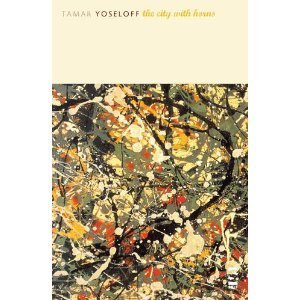Review of Tamar Yoseloff's "The City With Horns"

Tamar Yoseloff has long been interested in urban landscapes, particularly ruined or decaying urban landscapes, and the first section of this new collection blends the often exhilarating feel of a modern city (not always the same one) with a consciousness of its past and its detritus.
brine, bladderwrack, the green rot
of the ocean floor
while in "Wish you were", two people in modern-day London are divided by their different sense of its past. Places, or versions of them, are anchored also to times, to periods in a person's life; the speaker of "London Particular" experiences the city differently for being the same age as her father was when he first arrived there:
The ghost of my father
emerges from a doorway at noon on Piccadilly,
his hair just turning grey, like the London day
he's sailing through in his double-breasted suit.
No more than smoke and mirrors-
that's what the city does
with its alleys, its burnished brown wood pubs,
scrappy parks towerblocks toppled to leave
a legacy of empty lots.
Yoseloff's outsider's-eye for London has always been sharp; of the poems in this first section, the only one that doesn't cut it for me is "Concrete", which keeps making assertions I don't really go along with - "It refrains from statement" - dunno, I've seen plenty of concrete buildings that didn't. As for "it is not charming/like daffodils or a pink tutu", I wouldn't use that word for either; daffodils are inspiring, a pink tutu is nauseating... Odd poem altogether, and I wish it weren't the first in the book, for I find it atypically weak.
The mid-section, which gives the book its title, consists of poems about, and sometimes in the voices of, Jackson Pollock and his circle. They aren't, mostly, ekphrastic in the sense of trying to re-create a single painting in words, rather a verbal re-imagining of a whole life's work. If the idea of imitating a splat of colour in words sounds daunting, it can be done with some bold juxtaposition of words and concepts; in the title poem, the god-in-disguise bull who carries off Europa is conflated with the half-man, half-bull Minotaur from a different legend altogether, while in "Singing Woman", we get the portmanteau word "tremulo", presumably a compound of tremulous and tremolo, with a hint of that other, sterile, compound, the "mule". "Connected" articulates the chaotic but not quite inchoate variousness of those splats:
Trees construct themselves into a solid mass
as the horse picks up speed
see, everything's knotted
                                   together
the way notes on a staff spell music, a factory
churns out things, each thing
itself, but also a component.
How easy it is when density
unlaces, and you find holes you can
crawl through-
The way verbal echoes lead on slantwise here, via unexpected leaps - "staff", for the more usual "stave", suggesting the "factory" where another kind of staff would work, "density" practically inviting the compositor to commit the misprint "destiny" - is reminiscent of MacNeice's notes like little fishes, suggested by the (piano) "scales" of the line before.
In the third section we are suddenly in more rural surroundings: a field, lemon groves, the sea. Yet here too we end up, in the last poem, "Indian Summer in the Old City", back in an urban setting, though this time a more gracious version of a city, reminding us what the word "urbanity" actually means:
Sun finds my face, so long in shadow,
drapes me in gold.
Brick softens to flesh, columns that framed our serious lives
are light enough to carry.
Yoseloff's last collection, the taut, tension-building Fetch, made more immediate impact on me, but I think this one might show more technical development. I'd certainly recommend it.
The City With Horns is published by Salt Publishing
Published on May 20, 2011 14:00
No comments have been added yet.



